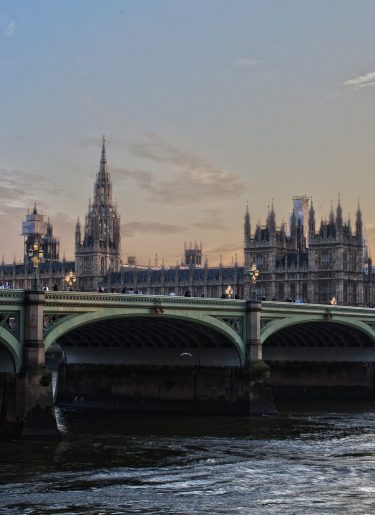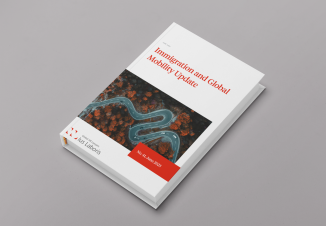
The last 12 months have seen some significant political changes and political turmoil around the world. Despite predictions of a shift to the left, in the UK the opposite occurred when Liz Truss replaced Boris Johnson, triggering an immediate shift to the right. Some commentators described her government as the most right-wing in a generation. However, the failure of her right-wing economic policies will likely propel a leftward political shift in the UK as well as deterring other countries from pursuing similar right-wing economic experiments. Current polling suggests that the most likely outcome of the next election will be a Labour government after 14 years of Conservative or Conservative coalition rule. If this proves to be correct, the UK is likely to see significant changes in workplace rights, tax policy and state intervention.
Boris Johnson’s government did not prioritise changes to employment laws. An Employment Bill which would have made some relatively minor and uncontroversial proposals (and which was first proposed three years ago) was not taken forward under his leadership. Workers’ rights have, therefore, remained broadly unchanged for many years.
However, the political climate is febrile and fast-moving in the UK. Any, even short-term, prediction on the future direction of employment law is fraught with uncertainty.
Liz Truss’ government took a significant step toward de-regulating workers’ rights by proposing a review of all EU derived employment laws with any laws not specifically retained or amended falling away at the end of 2023 by reason of the sunset clause in the so-called Brexit Freedoms Bill. It has been reported that Rishi Sunak’s government may push back the date or even change approach. The government’s Autumn Statement included a commitment to review retained EU law to identify changes which could be made over the next year “in key growth industries – including digital technology, life sciences, green industries, financial services, and advanced manufacturing”. It remains to be seen if this heralds a more restrictive approach to the review in the short-term at least. Polling commissioned by the TUC shows voter support for maintaining EU-derived employment protection laws. It also remains to be seen what approach the government led by Rishi Sunak will take more generally to workplace rights. It seems unlikely that there will be any major changes.
Globally, elections in the last year have included Canada, Chile, France, Hungary, Australia, Colombia, Chile, Sweden, Italy, Brazil, Israel, Denmark and the mid-terms in the US. The last German and Japanese general elections took place in September and October 2021 respectively. There have, therefore, been new leaders or elections in all G7 nations in the last year or so. There has been no discernible political trend in these elections. The implications of political change on employment regulation are further complicated by the growing shift from economic and political divisions to social and cultural ones.
The impact of a left-wing government on employment laws can be seen in Australia with the left-wing Anthony Albanese government setting out radical changes to promote wage growth and limit lengthy industrial action.
A year ago it had appeared possible that Joe Biden’s radical policies in the US would influence employment policies around the world. However, the Vice-Presidential casting vote in the Senate has proved insufficient for many of Biden’s more radical plans to become law. Following the mid-terms the Democrats lost control of Congress effectively ending any more radical ambitions. A year on, the US looks from the outside to be ever more divided.
Under Boris Johnson, the UK saw little change to worker rights and, despite Liz Truss’ promises of de-regulation, it was reported that she saw unpicking employment rights as a step too far and vetoed, her Business Secretary’s plans to reduce worker rights. Rishi Sunak’s government’s approach to worker rights is awaited.
The Labour party’s green paper on employment rights suggests that, in power, it would: enhance collective bargaining rights; introduce a right to switch off from work; make those rights currently dependent on having a period of employment into day one rights; abolish “worker” status so that all those not “genuinely self-employed” acquire employment rights; remove the cap on unfair dismissal compensation; abolish zero hours contracts; and make “fire and re-hire” unlawful.
The Liberal Democrats, on whom Labour might have to rely to form a government, go less far in their proposed reforms and propose not to abolish zero hours contracts but to increase minimum wage for those on these types of contracts to 120% of minimum wage and to replace “worker“ status with that of a “dependent contractor” with clearer rights.
2022 has seen a resurgence in strike action in the UK, no doubt linked to a resurgence in inflation levels not seen since 1990 as unions seek to protect members from cost of living increases.
In the UK, Deliveroo and the GMB union reached a breakthrough agreement for union representation for its self-employed riders. In recent months the US also experienced breakthroughs for unions, voting in favour of union recognition at over 100 Starbucks stores in the US.
One event in March 2022 which may herald a shift in attitudes towards enhanced worker rights in the UK was the decision by P&O Ferries to replace its crews on ferries sailing to and from British ports with seafarers employed from outside the UK on pay well below UK minimum wage levels. Although, in part, the relevant laws were unique to crews working on ships, the outrage across the political spectrum and in the public at large will likely act as a reminder of the political risks of weakening worker rights.
Evidence of a renewed expectation on state intervention can be seen from the unprecedented levels of government support to control energy prices. Attitudes to welfare benefits have been changing in the last five years and the latest British Attitudes Survey shows attitudes remained largely unchanged over the last year with a slight increase in those who considered that “many people who get social security don’t really deserve any help”, but with many more disagreeing than agreeing with that statement.
Attention has continued to be paid to universal basic income with a House of Commons debate on its merits having taken place in June 2022. Trials of universal basic income policy continue, with the Welsh scheme targeting care leavers launched in July 2022. Support for universal basic income has been found to be relatively evenly spread across ages and classes, but is reported to be much greater amongst Labour voters than Conservatives.
The UK’s economic woes call into question any short-term real increase in public spending. The UK government’s Autumn Statement confirmed that most areas of expenditure would not increase in real terms and so amount to cuts in actual terms. The NHS was one area to escape these real term cuts, benefitting from an additional £8 billion in public funding over the next two financial years. Notwithstanding increased numbers of nurses and doctors, the projected demands for healthcare professions to meet the needs of our ageing population are staggering. The government appears to be on track to meet its 50,000 nurses target by 2023/24, largely through substantial increases in international nurse recruitment. However, this would still leave the NHS short of around 38,000 full-time equivalent hospital and community health service and general practice nurses in 2023/24 relative to projected demand. The shortfall in GP numbers is projected to more than double by 2030/31 to 8,800.
Tax policy headlined the news throughout the autumn in the UK, with Liz Truss’ government cutting taxes and then swiftly back-tracking after fierce backlash from the markets, the public and many of her own MPs. In the Autumn Statement, the government veered in the opposite direction by freezing personal thresholds until 2027/28 – effectively increasing tax payments for all taxpayers in real terms. It also reduced the threshold at which the highest 45% rate of tax is payable.
General support for raising taxes to pay for increased expenditure on health, education and social benefits has been growing over recent years, with very little support for reducing taxes and spending less in these areas. The latest figures show that support to raise taxes to fund increased spending on these areas has increased further, with: 52% in favour; 40% supporting keeping taxes as they are; and 6% favouring reducing taxes and expenditure on these areas.
As working arrangements evolve, the UK Office of Tax Simplification has published a call for evidence on the tax issues surrounding hybrid working.
In mid-2022, in the UK, the Cabinet Office and the Department for Business Energy and Industrial Strategy both announced reviews focussed on future of work. It remains to be seen how these reviews will be taken forward in light of the subsequent political changes in the UK.
For more information about employment law



